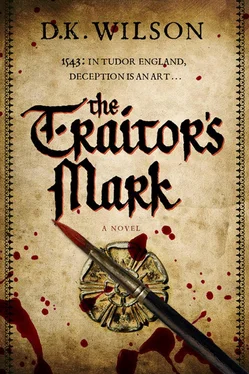D. Wilson - The Traitor’s Mark
Здесь есть возможность читать онлайн «D. Wilson - The Traitor’s Mark» весь текст электронной книги совершенно бесплатно (целиком полную версию без сокращений). В некоторых случаях можно слушать аудио, скачать через торрент в формате fb2 и присутствует краткое содержание. Год выпуска: 0101, Издательство: Pegasus Books, Жанр: Исторический детектив, на английском языке. Описание произведения, (предисловие) а так же отзывы посетителей доступны на портале библиотеки ЛибКат.
- Название:The Traitor’s Mark
- Автор:
- Издательство:Pegasus Books
- Жанр:
- Год:0101
- ISBN:нет данных
- Рейтинг книги:5 / 5. Голосов: 1
-
Избранное:Добавить в избранное
- Отзывы:
-
Ваша оценка:
- 100
- 1
- 2
- 3
- 4
- 5
The Traitor’s Mark: краткое содержание, описание и аннотация
Предлагаем к чтению аннотацию, описание, краткое содержание или предисловие (зависит от того, что написал сам автор книги «The Traitor’s Mark»). Если вы не нашли необходимую информацию о книге — напишите в комментариях, мы постараемся отыскать её.
The Traitor’s Mark — читать онлайн бесплатно полную книгу (весь текст) целиком
Ниже представлен текст книги, разбитый по страницам. Система сохранения места последней прочитанной страницы, позволяет с удобством читать онлайн бесплатно книгу «The Traitor’s Mark», без необходимости каждый раз заново искать на чём Вы остановились. Поставьте закладку, и сможете в любой момент перейти на страницу, на которой закончили чтение.
Интервал:
Закладка:
‘No,’ Walt said gloomily, ‘and it will reduce the number of cases to be heard when the courts do reopen.’
‘How so?’ I asked.
‘Well, think of all the prisoners who will die in the stinking overcrowded jails.’
‘What brings you back?’ Ned asked. ‘You would do well to stay away until a change in the weather clears the hot and moist humours.’
‘I shan’t venture inside the City,’ I explained. ‘I will take a boat to Bridewell Quay in the hope of seeing Master Holbein and giving him the good news about his sons.’
I explained about the letter I had received from John of Antwerp.
‘What a sad muddle,’ Ned said. ‘The poor man must be distracted with grief.’
‘Indeed. That’s why I must get to him as soon as possible. By your leave, Ned, I will go now and, I hope, be back in an hour or so.’
‘God’s speed,’ the old man said. ‘I pray you will be able to bring that poor fugitive some cheer.’
Sadly, Ned’s supplication was not answered. When I reached Bridewell I found Holbein’s door open. His room was deserted and in chaos. Everything lay strewn about the floor – bedding, food, dishes, papers, canvases, brushes, all littered in confusion. Vivid paints were spread everywhere, as though they had been deliberately poured over the debris. I found a stool, wiped it over with a tom sheet, sat down and tried to work out what could possibly have happened. Clearly, I was too late. Black Harry must have received from Moyle the details of Holbein’s hiding place that I had foolishly revealed. There was something astonishing about the man’s persistent vigour. Ned would have called it diabolical. He would probably have been right.
I stood and wandered around the room, picking up items, turning over others, in the vain hope of finding some clue to what might have happened to the painter. I set the easel squarely on its feet and picked up the last painting he had been working on. I saw now that it was a self-portrait. I gazed at the familiar features – the fringe of dark beard in the German fashion, the serious, almost severe set of the mouth, the penetrating eyes that appeared more searching of me than I of them. Not for the first time, I marvelled at the skill of this remarkable craftsman, who could capture a likeness with such awesome precision. It struck me that I was looking at his last piece of work. Johannes Holbein must, by now, surely be dead. I could not imagine that Black Harry and his ruffians would have wasted any time before killing him. I tried to picture the horror this place must have recently witnessed. I imagined the sadistic attackers inflicting as much pain as possible upon the victim before removing his body, perhaps in a sack to be disposed of later or slipped unobtrusively into the refuse-laden river.
After a last look round, I let myself out. As I turned the key in the door, something suddenly struck me as odd: why had I found the room locked when I arrived? If the gang found Holbein here and took him away – dead or alive – why would they waste more time getting the key off him and locking the door behind them?
‘What will you do now?’ Ned asked when I returned to Southwark.
‘I must send word to Cranmer. Then I’ll go to Chiswick to call once more on the Fleming. I must tell him about his friend, if he does not already know. But these things will have to wait until tomorrow. I’m weary now – to the very depths of my soul.’
The following morning – Monday 27 September – I despatched one of my men to the archbishop with my report. That done, I hired a boatman to row me up to Chiswick. If my discovery at Bridewell had been a shock, what met me at the elegant house of van der Goes was almost as disturbing. Two burly men with heavy clubs guarded the door and demanded my business. Only when this information had been relayed within was I admitted. The sombre atmosphere inside was immediately apparent. I was shown into a small anteroom, where the goldsmith’s English wife sat attended by two female attendants. She had obviously been crying and she still clutched a kerchief in trembling fingers.’
‘Whatever has happened?’I demanded.
‘Oh, Master Treviot,’ she wailed. ‘Do you know aught of this business? My John has done nothing to deserve what those men did to him. Who are they? I thought they would kill him.’
I was gripped by terrible foreboding. ‘Was the leader a tall man with black hair?’
‘Yes, yes! In heaven’s name, who is he? Why did he force his way in here at first light? What grievance can he possibly have had with John?’
‘Mistress, I am deeply sorry for your distress but ’tis vital I see your husband. May I go to him?’
She looked doubtful. ‘He is very weak … but if it will help to catch these wretches.’ She motioned to one of her companions who silently led me up the stairs to the main bed chamber.
The curtains of an impressive bed were drawn back. Van der Goes lay partially propped on the pillows. His head was bound with a cloth which bore traces of blood and his face was bruised and swollen. I seated myself on the bed. ‘Dear God, what have they done?’ I muttered as much to myself as to the recumbent merchant.
He partially opened his lids and, with evident difficulty, focused on me. ‘Brother Treviot, is that you?’
‘Yes, what has happened here?’
‘It was those enemies of Johannes Holbein. They came looking for him.’
‘Today?’ I was confused. Or, more likely, it was van der Goes whose mind was fuddled.
The sick man nodded and winced with the pain. ‘Very early. I had scarcely risen.’
I pictured Holbein’s lair as I had last seen it with its broken and scattered furniture. ‘But the ruffians were at Bridewell yesterday. I was sure they must have found Holbein.’
‘No. Their leader – a tall brute – said they spotted Johannes and followed him to Bridewell but he escaped them.’
‘How could he do that? There’s only one way in and out.’
‘He has a key to a small store room next door and it has a trapdoor to the floor below. That was one of the reasons Johannes chose the place for his secret studio.’ Van der Goes closed his eyes again and I feared he was lapsing into unconsciousness.
‘Why did they come here?’ I asked. ‘Why did they do this to you?’
Van der Goes moaned. ‘They were angry – very, very angry about losing Johannes again.’
‘But why come to you?’
‘They discovered that I own the warehouse and let out the space. They thought I’d know where Johannes has gone.’
‘But you don’t?’
‘If Johannes is not at Bridewell, I know not where he is,’ the injured man said, with great difficulty.
‘You don’t suppose …’I could hardly bring myself to mention the fearful question that occurred to me. ‘He must have been terribly distressed to know that his sons had fallen into Black Harry’s clutches. Is it possible he might have been overwhelmed with remorse. Could he have …’
‘Taken his own life? I don’t like to think it … Yet … He was very broken when he heard about the children … Poor Johannes! Is there anything to be done?’
‘I can try the Steelyard. Someone there might know something.’
‘Yes,’ van der Goes said, ‘that is our only chance. Pray God you find him there or hear news of him.’ His head fell back against the pillow.
I stood up. ‘I must let you rest. Take care of yourself. You have been a good friend to Holbein. I would not want to see you suffer more for him than you already have.’
‘Thank you,’ van der Goes muttered weakly. ‘You, too, have tried to help him, Brother Treviot. Perhaps if I had trusted you more at the beginning.’
‘Please, do not think like that. We have both made mistakes. I pray God grants us wit and time to put them right.’ I crossed to the door. ‘I promise to send you any news I have.’
Читать дальшеИнтервал:
Закладка:
Похожие книги на «The Traitor’s Mark»
Представляем Вашему вниманию похожие книги на «The Traitor’s Mark» списком для выбора. Мы отобрали схожую по названию и смыслу литературу в надежде предоставить читателям больше вариантов отыскать новые, интересные, ещё непрочитанные произведения.
Обсуждение, отзывы о книге «The Traitor’s Mark» и просто собственные мнения читателей. Оставьте ваши комментарии, напишите, что Вы думаете о произведении, его смысле или главных героях. Укажите что конкретно понравилось, а что нет, и почему Вы так считаете.












